#who has been gatekeeping the sea bunny
Text
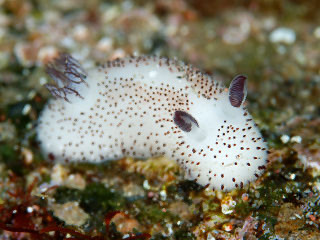

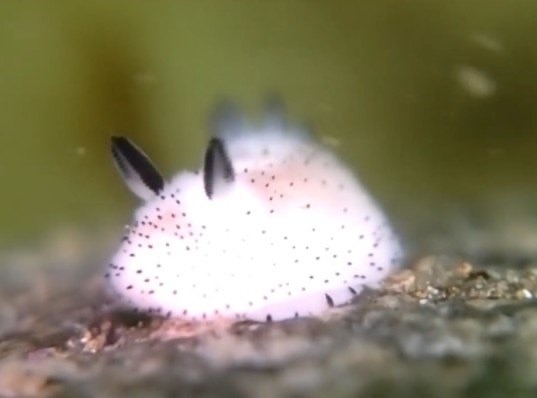
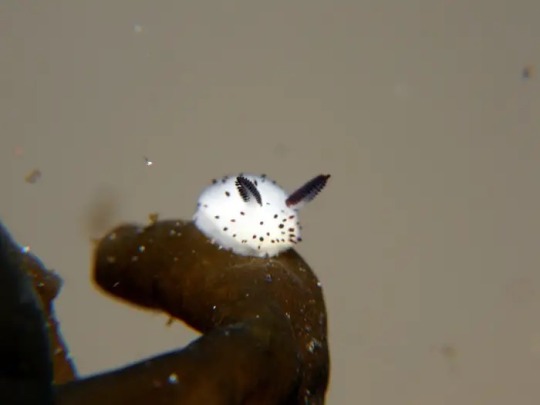
sea bunny posting because i just found out that they exist and i trust them and i can’t sleep anymore
#why did no one tell me about them#and they kinda look like my bunnies#why don’t they teach this in schools#who has been gatekeeping the sea bunny#am i just insane#bunny#sea bunny#sea slug#cuties#sea creatures#animals#ocean life#everyone look at them
5 notes
·
View notes
Text
C l a i r. De. L u n e


Pairing : angel reader x banished angel jaemin.
Genre : plotless comedy, fluff, mutual pinning
Words: 1.1k
Warnings: it's suweeeet. Mentions of fire, hell.
Prompt : mmm..it's warm
A/n : part of SEXC WRITERS COLLAB consisting of members - @raibebe , me and @ncteaxhoe
This fic is dedicated to the doyoung to this haechan, rai @raibebe ! 🤍💚🤍💚🤍💚💚
Thank you for beta reading @lofied . God bless whatsapp!

Perched on the soft and velvety enchanted cloud, you consciously fluttered your legs, letting your naked toes play with the flowing water. In the middle of the majestic ocean, the spotlight of the moonlight drenched your pristine white wings in the ruthless glow as if it had been waiting for your arrival only. It has been many moons since you last visited this entrance to the human world. Until last month,at the break of the darkness, every day, you and jaemin had been flying away from your home to this place to allow yourself a taste of thia foreign sphere that your serene, plain, disciplinary realm never provided and today you were here, waiting for the same boy just to see his face, a sentiment, that according to you,wasn’t worthy of being revealed.
Nevaeh realm was indeed and quite literally a dreamer’s paradise but for younglings like you and jaemin, it lacked the delight and colour that oh so beautiful underground Nrub realm's fires showed. You attributed your attraction for that fiery hell to the white and cream that engulfed you in tranquil and also because it seemed unattainable for you, just like the thought of underground was supposed to be for all the unsullied beings. All things considered, underground was forbidden for everything pure, including you and jaemin. But nobody remembers the last time jaemin had listened and the last time you had made any attempt to stop him.
Eyes lost in the depths of the sea, you felt your right wing folding itself into your waist. Pausing your movements, craning your neck, you saw jaemin flapping his grey wings, a captivating smile wrinkling his nose in some unknown shape.
Grey?
You tilted your torso a little more to look at his ruined feathers.
"What in the fairies have you done to these beauties?" eyes widened in disbelief, you queried.
Shooting you his infamous fake pouty bunny teeth, he responded as his hands danced every way to exaggerate his pain,
"The underground isn't a place for angels”, he spoke with a nasal voice, “The smoke spares none. You should be glad you are seeing me in full piece."
"I thought you would have been roasted by now but you look completely fine."
The sarcasm in your voice was nothing new for him but he had begun to miss it. Awfully! Never in his wildest dreams had he imagined being at the other end of mother angel’s wrath.
Of all the younglings, him only?
Jaemin had been banished to the gates of underground for a few months as a penalty. Penalty for throwing mystic snowballs at the youngest son of the devil, which resultantly had him sick for a week.
"Make space for me." He pleaded and rolling your eyes, you extended the cloud seat with one twirl of your finger.
Oh how much he missed his baby magic!
"No one makes better clouds than you!" He exclaimed before sitting on the squashy seat but the sigh of relief that escaped him was something unexpected.
"What is it now?" Annoyed, you questioned.
"Even the underground gates are hotter for my buttocks. I don’t know how Johnny survives being the gatekeeper of that hellish place. It’s impossible to breathe in there, my wings are dirty, i’m grey, my hair have ashes in them, I no more look pretty, the little spawns make fun of me at any possible chance they get and because I can’t get past the first door, they don’t even hesitate while calling me brutal names!” he cried out with a pout.
"who had told you to play with him in the first place. their souls are weaker than ours jaem. Just because we can endure a little heat doesn-
"yangyang shouldn't have been wandering on the common grounds in the first place so it’s not my fault that i forgot about their souls or whatever. Nobody said a word to him but this beautiful boy was sent off without any apology!”
A giggle left your lips at his dramatics. He really had the audacity of acting like the purest being, which he undoubtedly was but he couldn’t look at his broken record of being a nuisance to the whole realm. Along with you and jungwoo of course.
“This cloud is so fluffy. No wonder you make the bestest clouds y/n” at the repeated praise, you straightened your back. Spreading your wings in their full glory, you proudly addressed him,
“Angel y/n, division third and rank second, jaem.”
“WHAT NO! CHEATER. WHEN DID THAT HAPPEN?”
“ha.ha. when you were busy being the assistant of johnny.”
Right then, you made a mental note for sending a gratitude gift for johnny. Had he burnt your letter, jaemin would have never met you today.
“THAT’S NOT FAIR. YOU ARE EARNING RANKS AND WHAT AM I DOING? EATING DUST?”
his statement turned your head towards his wings. The dirty ones. Raising your finger, you ordered him,
“get up. Let me clean your feathers first.”
“no!” he shouted again, “they’ll know I went out and Johnny would be in trouble with mother angel.”
Realisation dawned on your face and you slouched down, hands finding solace in your lap.
“I thought you were getting toasted. You seem to be happy with that johnny. Don’t you miss playing with us?”
The disappointment in your lyrics was patent and he felt something tugging his insides, something he had felt many times before and had chosen to ignore it each time.
A smile graced his lips watching your romantic face sparkling like the sheet of stars that he adored so much. ludicrous was his love for you, as jungwoo explained and he loved nothing more than being a fool for you.
“how can I be fine when that small place feels like those thousand firecrackers we once saw on this earth.”
“and you smell like that orange food place we visited once.”
“oh yeah? give me your hand!”
You screamed at him but he gripped your hand and planted it on his feathers instead.
“that’s how I feel when I’m toasting in there!”
“mmmh…it’s warm!”
Surprised, you immediately retracted your hand and hugged it closer to your chest.
“see! I’m not joking.” His lips were twisted grimly as he said those words. However tempting the other side was, he still didn’t belong there. it wasn’t home.
“let’s have a competition”
“what?”
Conjuring a few pebbles, you handed him half of them.
“stone skipping!"
Stilling the water just right for the skipping, you started with your stones and chuckles filled the quiet night with much needed happiness.
“is your butt cool enough now.”
Mindlessly, you asked.
“yeah. thanks to you, it is.”

Heaven: nevaeh , burn : nrub 😂 I'm not that creative plzzz🍿
A 🤏 feedback is always appreciated lovelies.
#neowritingsnet#cznnet#nct-writers#kafenetwork#nct scenarios#nct imagines#nct fluff#nct drabbles#nct x reader#nct smut#jaemin scenarios#jaemin smut#nct dream smut#nct dream scenarios#nct dream fluff#jaemin x reader#jaemin imagines#nct timestamps#nct reactions#nct fanfics
128 notes
·
View notes
Text
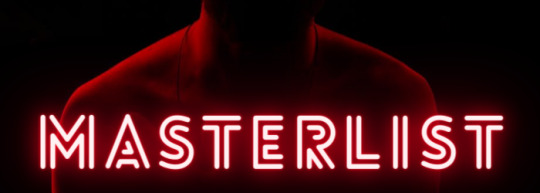
KEY
☽ - angst | ♡ - fluff | ꕤ - smut | ⛒ - dark
i’ll be updating this as I go! this will be the first place i announce the actual publishing of fics, so y’all know when to expect them officially, but i do also have a wip list for you if you’re curious about what i’m actually physically writing. every series i post will also have its own masterlist page, which is always going to be linked with the story’s blurb and in the actual post for the fic.
✧ 666 masterlist
stories that feature you, a millenia-old vampire lovingly nicknamed Medici by your friends, and the somewhat debauched and very interesting adventures you all have.
✧ monsters and gods masterlist
a series of oneshots, each centering around the greek gods and legends. learn the truth behind the myths, and see how some of these deities and creatures of old navigate the modern world.
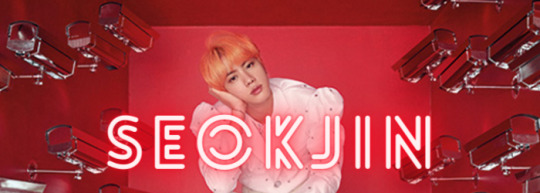
✧ lay me gently | greek god!au | ♡ ꕤ | 12.9k | monsters and gods pt 2 | 9.7.2019
there is no time for loneliness among the fires of your forge, no room in your buzzing mind for thoughts of anything but your next invention and the pain in your leg. your life is tilted off its axis, though, when your parents arrange a marriage without your knowledge or consent, and your new husband begins to situate himself into your life despite protests from either of you. you don’t know what zeus and hera have planned, but a volcano is no place for a love god like seokjin.
✧ 666 butterfly kisses (666verse) | vamp!reader, fae!jin | ꕤ | 4.7k | 6.10.2019
✧ birthday candles | ꕤ | vamp!reader, werewolf!yooongi, fae prince!jin | 4kish | 11.11.2019
you’re a vampire in renaissance italy who likes earning favors from the most powerful men in the country. you just aren’t used to meeting handsome men that might be assassins and definitely give you the best orgasms of your life.
or; the first time you met the fae prince, but certainly not the last. | 666 masterlist
a few of your friends help make your birthday extra special. | 666 masterlist
✧ half-baked holiday | ♡ ꕤ | baker!jin, grump!mc, f2l, i2l | 12.6k | 04.12.19
Granny Park’s Gossip:
That Seokjin, don’t get me started on him. He’s worked hard to open and run that bakery of his, you know, and I’m so proud that it’s so successful now. Wish he would find a nice person to settle down with, though, he deserves it, as long as he’s been on his own. Well, I guess you can’t really call it alone when he’s got that grump of a best friend always hanging around him. He really should be paying her, what with all the time she spends at the bakery with him. She’s always waking up on the wrong side of the bed, but she’s not so bad when she brings me some of those cookies of his, or just around Seokjin in general, if I’m honest. Too distracted by staring at that pretty face of his, I suppose, though who can blame her? | part of The Snowball Effect Collab
✧ monachopsis | ☽ ♡ | namjin | selkie!jin, marine biologist!joon | 5.7k | 16.03.20
seokjin knows - has known, for years - that his life will be like this forever. there is no more sea, there is no more swimming, there is no more of anything he used to know. this is life - wake up, go to a shoot, try not to piss giho off, go home, sleep, wake up again. because he was caught. because giho owns him. because he can’t.
but then he meets namjoon. and seokjin starts to realize that maybe…just maybe. he can.

✧ from eden | greek god!au | ♡ ꕤ ☽ | 15.6k | monsters and gods pt 1 | 16.6.2019
you’ve been in the dark a long time, overworked and exhausted. the only bright point is your gatekeeper, hoseok, your closest friend and the man you love but can’t have. you’ve accepted that loneliness is inevitable for you. when a voice calls to you, though, and moves you so deeply that you rip open the earth to help them, you meet a mint-haired boy that changes everything you thought you knew about your prison. | ft jhs | alternate ending
✧ penguins | boyfriend au | ꕤ | 3.5k | 18.7.2019
your long-time boyfriend takes you on a cute date to an aquarium, but gets a little jealous when you run into an old friend. it becomes his mission to set you back on track and remind you just who you belong to.
✧ backalley brawl (666verse) | werewolf au | 3.5k | 23.9.2019
You've been followed by a werewolf all day, and you're done being stalked in the night. Somehow you didn't expect him to need you to help him with a rather sensitive problem.
or; yoongi’s in rut and needs someone to help him out | 666 masterlist
✧ birthday candles (666verse) | ꕤ | vamp!reader, werewolf!yooongi, fae prince!jin | 4kish | 11.11.2019
a few of your friends help make your birthday extra special. | 666 masterlist
【min yoonji】
✧ as we go along | ♡ ꕤ | neighbors au, e2l, pining | 10.4k | 24.12.2019
Four years ago, the beautiful stunning attractive frustrating Min Yoonji came into your life. Ever since, it’s been a competition between the two of you to win the HOA’s Holiday Decorating Contest. The fiery looks she gives you paired with the pointed insults throw you off your game every year, but not this time. This holiday season, you’re determines to win; and along the way you might just find that Yoonji’s been trying to win something else.
;OR the queer hallmark movie of your dreams. | part of the 25 Days of Christmas: A BTS Anthology

✧ amae | neighbor!hobi | ♡ | 6.7k | 28.05.2019
amae - japanese. the way you act when you want to depend on another person. relying on someone’s goodwill and love to help you. frequently thought of as wanting to be loved and taken care of.
when someone new moves in next door, you don’t expect to become friends. everyone on your block was friendly, yes, but none of you gave more than a courteous wave when you spotted each other in passing. that changes with jung hoseok; a literature professor with sunlight gleaming out of every pore, who enjoys complex lectures, random coffee trips, and…sleeping in your hammock? curiosity gets the better of you as you befriend him, but just what could have this man sleeping in your garden hammock every night?
✧ from eden | greek god!au | ♡ ꕤ ☽ | 15.6k | monsters and gods pt 1 | 16.6.2019
you’ve been in the dark a long time, overworked and exhausted. the only bright point is your gatekeeper, hoseok, your closest friend and the man you love but can’t have. you’ve accepted that loneliness is inevitable for you. when a voice calls to you, though, and moves you so deeply that you rip open the earth to help them, you meet a mint-haired boy that changes everything you thought you knew about your prison. | ft myg | alternate ending
✧ hearts on fire | hanahaki au | ♡ ☽ | 6.5k | 02.02.2020
Hoseok has been in love with you for as long as he can remember, and he’s beyond excited to see you married and glowing.
He just really wishes that he was the groom.

✧ give and take | mechanic!au | ♡ ꕤ | 10.5k | 18.05.2019
when your beloved jeep breaks down, you have no choice but to take it to a mechanic for once instead of trying to fix it yourself. you fully expected to empty your wallet or get told to just buy a new car. you don’t expect to meet kim namjoon, nor do you expect him to be hot like burning, sweet as honey, and interested in you.
✧ backseat memories | mechanic!au | ♡ ꕤ | ongoing drabble series | 18.05.2020
A collection of memories between you and the mechanic who saved your Jeep.
;or, the give and take sequel | on ao3
✧ 666 medici drive | supernatural!au | ꕤ | 4.5k | 30.08.2019
you decide to help garden witch kim namjoon gather ingredients he needs from local incubus kim taehyung, in a much more fun way than the two originally planned. | ft kth | 666 masterlist
✧ forever rain | ghost!reader au | ☽ ♡ ꕤ | 18.8k | 12.09.2019
being dead isn’t anything exciting. just a lot of walking the same halls of the same apartment day after day after day. things change when the new tennant arrives, though. kim namjoon isn’t anything you could have expected; not the way he’s so careful and gentle with his plants because he breaks so many other things, not the way his friends joke that he’s psychic because you refuse to let him get in the face one time, and certainly not the way he comes after literal months spent moving things away from table edges for him and announces that he knows he’s being haunted and he has some questions for you. you didn’t know ghosts could fall in love, but he makes you feel alive again, like you’re standing in the rain while thunder crashes around you. you should’ve known nothing good would come of falling in love with someone living, though. you should’ve known that heartbreak was the only way this could end. that the rain doesn’t last forever.
✧ midnight wishes | roommates/coworkers/fwb au | ☽ ♡ ꕤ | 10.3k | 21.12.2019
Granny Park’s Gossip:
That boy. Never met anyone as prone to disaster as he is while being so damned smart, except maybe that roommate of his. The two of them could probably cure cancer if they wanted to, but you leave them alone for more than a few seconds and you’re liable to come back to disaster. Jiminie did say they’ve been acting a little different, though, maybe they finally wised up and made things official instead of just humping like bunnies around that apartment of theirs. Oh, am I not supposed to say that? | part of The Snowball Effect Collab
✧ monachopsis | ☽ ♡ | namjin | selkie!jin, marine biologist!joon | 5.7k | 16.03.20
seokjin knows - has known, for years - that his life will be like this forever. there is no more sea, there is no more swimming, there is no more of anything he used to know. this is life - wake up, go to a shoot, try not to piss giho off, go home, sleep, wake up again. because he was caught. because giho owns him. because he can’t.
but then he meets namjoon. and seokjin starts to realize that maybe…just maybe. he can.
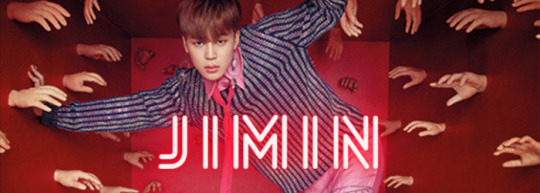
✧ coming soon ✧

✧ 666 medici drive | supernatural!au | ꕤ | 4.5k | 30.08.2019
you decide to help garden witch kim namjoon gather ingredients he needs from local incubus kim taehyung, in a much more fun way than the two originally planned. | ft knj | 666 masterlist
✧ black irises in the sunshine | greek god au | ☽ ♡ ꕤ | 14k | monsters and gods part 3 | 31.12.2019
anger is everything. other gods tease you for the short fuse, but it comes with the territory. people have called you stupid, have called you dumb, oafish, useless, incompetent, insolent, rude, arrogant. all of it. insults and mockery flung at you, but even your skin isn’t thick enough to deal with constant abuse. it’s the exact reason you keep going to the underground, knuckles bloody and bruised, fighting anyone that dared enter the cage. it’s the reason you go to the clubs, surround yourself with mortals and their writhing bodies. it’s there that you see him the first time, voice husky as it rolls through the room. it’s there you find someone who treats you differently than the rest. you just never expected him to be one of the muses.

✧ chasing butterflies | nerdy!jk | ♡ ꕤ | 12.7k | 01.06.2019
you never meant to be a jock in school. the volleyball team had just needed people and you were there and then you had a knack for it. you just happened to be good at it and went with it. similar to how you saw jeon jungkook in your friend’s orientation group and thought he was absolutely radiant and just went with it. for two years. you’ve spent the entire time pining from afar, mostly because you always seem to make a fool of yourself when he’s around, but also because jungkook is part of that exclusive crowd, the ones that you never can seem to penetrate: the weebs. that is, until your friends get sick of your hopeless pining and decide to do something about it. | sequel drabble posted 01.09.2019
✧ birthday candles | ꕤ | vamp!reader, werewolf!yooongi, fae prince!jin, small kook feature at the end | 4kish | 11.11.2019
a few of your friends help make your birthday extra special. | 666 masterlist
© ddaenggtan, 2019. I do not give permission to have my work reposted on any site.
1K notes
·
View notes
Text
Radical Reinvention – The Making of Edwige Belmore
History is kind to those who leave behind a tangible body of work. It is less so to those exuberant personalities that lived with great flair, but channelled their creative energy into more ephemeral modes of expression. Babette is fascinated with oral histories of these more fringe personalities in the history of art, design and pop culture. One of them is Edwige Belmore (1957–2015). A subcultural icon who criss-crossed between Paris and New York, Edwige played in several punk and new wave bands in the ‘70s and ‘80s (most memorably Mathématiques Modernes), starred in a spate of experimental films, was photographed by Helmut Newton and walked the runway for Jean Paul Gaultier and Thierry Mugler. And yet, no one of these things quite encapsulates (or contains) her legacy.
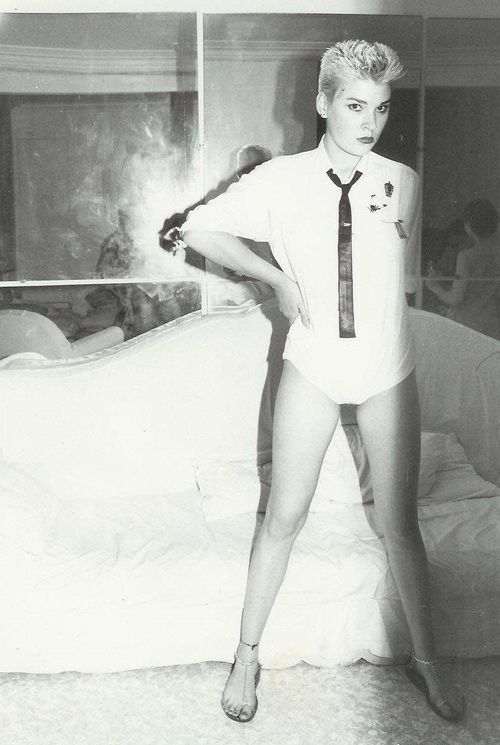
When Edwige worked as the Maitresse de Maison for French fashion house Agnès b’s New York store, she was told by a ‘friend’ “that it must be pretty cool to be paid for doing nothing”.“I’m not doing nothing,” she retorted, “I’ve been something for my whole entire life,”[1] and its that intangible ‘something’ that burns most brightly of Edwige’s legacy. Her essence. Her attitude. The way she presented herself to the world.
It is deemed shallow to suggest that someone be remembered for their ‘look’, but Edwige was no fashion plate. Rather, she used her body as her primary means of expression. With her cropped, peroxide blonde hair and a razor blade hanging from one earring, Edwige radicalised the Paris fashion world in the 1970s. She walked the tightrope between a DIY, street-punk aesthetic and high fashion: “She was punk with total elegance,” reflects videographer Clayton Patterson.[2] When top French fashion houses would gift her free items, Edwige would style them with her wardrobe of battered hand-me-downs. “I did a concert with Matématiques Modernes wearing jeans that were completely destroyed, a Chanel jacket and a push-up bra,” she told Italian Vogue before her death. “I didn’t want to be like every punk in Paris, or every punk around that dresses exactly the same.”[3]
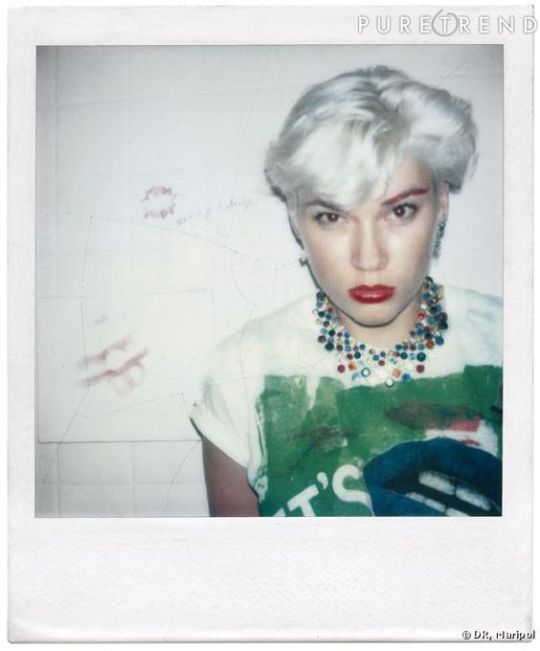
Edwige also pioneered a new aesthetic for queer women. She was openly bisexual, romantically linked to Sade and Grace Jones, and sported a playful combination of butch and femme aesthetics, teaming mannish suits with bright red lipstick. “She was the legendary lipstick lesbian,” photographer Marcus Leatherdale told New York Magazine.[4] When she spent six months in Japan in 1982, Edwige would sneak into the male-only sex clubs of Shinjuku, pretending to be a boy.[5] It’s hard not to imagine that the 1982 science fiction film Liquid Sky, with its androgynous lead Margaret (Anne Carlisle), a queer club kid with cropped, peroxide hair, is not at least partially inspired by Edwige.
This subversive aesthetic was not limited to clothing. Edwige took a diaristic, even confessional, approach to tattooing that was quite unique among her generation: “My tattoos are stepping stones in my life – moments, loves, fears, messages”.[6] Patterson reflects, “It was highly unusual for someone to have words and sentences on their body in the mid-’80s”[7] and in a eulogy published on the punk blog Please Kill Me, Sandra Schulman (a former lover of Edwige’s) recalls that Edwige’s tattoos “lined her thin arms and up her neck, scripted across her collar bone and trailed down her legs”. Many were part of a project in which “she asked all her friends and lovers to mail her a note in their handwriting and she would ink it onto her body.”[8]
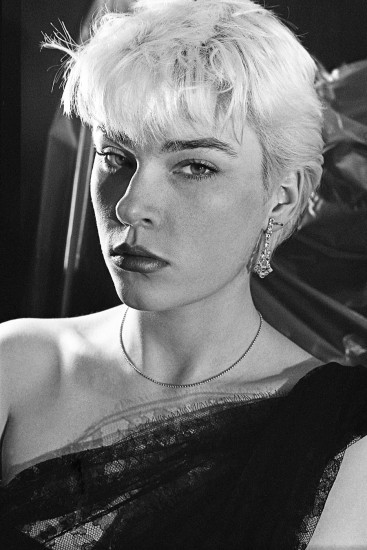
Edwige clearly saw her flesh as a canvas, but what is more provocative by today’s standards was not her tattoos, but the self-harm scars she wore unapologetically alongside them. Schulman describes bringing Edwige swimming at a New York health club: “In the women’s room she stripped down, strode around, and had the Village gym bunny ladies gasping at her scars, tattoos and boy/girl manner. Six feet tall barefoot.”[9] Patterson also remembers the scars: “She was such a beautiful woman, a Paris runway model, and to have her body modified like that was also very unusual.”[10]
Though self-harm was as taboo in the ‘70s and ‘80s as it is now, Edwige abided by an approach of candid honesty. “She told me that ‘everyone has a past’,” reflects model agent Kendall Werts, “but that the past will never define your future.”[11] In New York Magazine’s eulogy, friends and colleagues remark that Edwige’s acceptance of her flaws and contradictions was part of her powerful appeal. “She was a super-glamorous femme-butch dyke who was honest about her struggles with pain, with depression — but she never dumped that on anyone. In fact, she cheered other people up without lying about her own struggles,” says writer and artist Penny Arcade.[12]
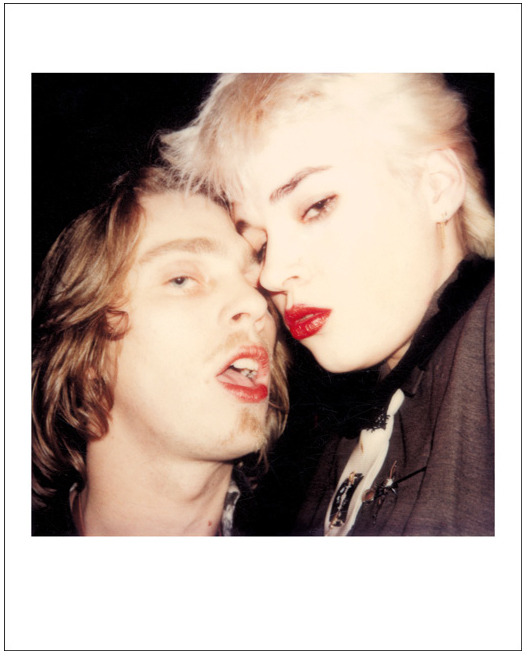
Edwige was candid about a great many things, and that includes her own ‘creation story’. In the few interviews with her available online, she recalls with earnest detail how she simply decided one day to reinvent herself and ‘become Edwige’. Abandoned by her parents at a young age (“They gave me $20 to have a life. They moved into the country side and I stayed in Paris,” she told Moco Loco in 2014),[13] Edwige was raised in a convent with little access to the music or subcultural movements of the early-1970s. That changed in 1976 when, aged 19, she saw the Sex Pistols perform live. It would prove to be a life-altering event: “No one at the time had SEEN anything like that! NEVER! It was the first MIND BLOWING new thing.”[14]
This brief exposure to the punk movement would inspire Edwige to reinvent herself with a remarkable degree of precision. “It was November 6 of 1976, I decided that in exactly a month from then that on December 6th: Edwige Will Die, and Edwige Will Be Born”.[15] True to her word, on December 6, she burned all of her clothing, bar one hand-me-down vintage leather jacket. “I decided to embrace that new movement … I wanted to be part of something. That was my family … I shaved my head, I burned all my clothes.”[16] She bought a pair of riding pants, a white shirt and a tie and took to wearing the same outfit day in, day out, like a uniform. “The real Edwige was born. The one before was shy, was ugly, was insecure, was scared.”[17]
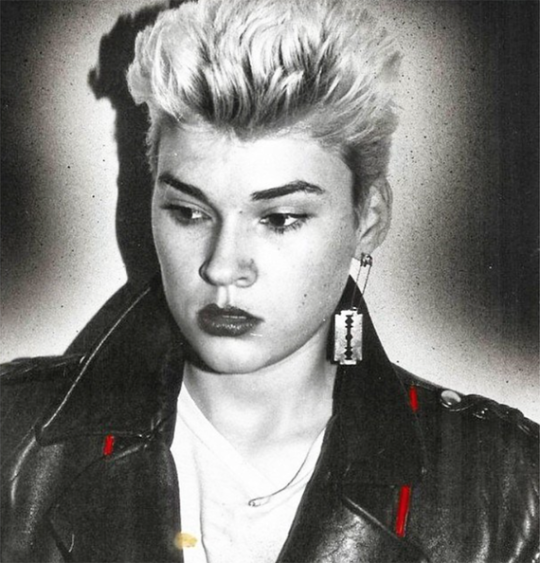
There is something remarkable about the agency Edwige took in her reinvention, or self-creation as it were. She is by no means alone among her generation in creating a new persona for herself, but unlike most ‘invented’ stars, she candidly acknowledges the constructed nature of this act, detailing the steps taken to become who she wanted to be. Much as Edwige’s flaws only added to her strength of character, revealing the constructed nature of her identity seems, to me, to add conviction to the act.
With ‘the new Edwige’ established, the next logical step was to join a punk band. It happened organically. “I was in a club and these two girls approached me and said, ‘Wow you look great! Want to be part of our band?’. I said ‘OK!’.”[18] The band was called L.U.V. (which could stand for either ‘Ladies United Violently’ or ‘Lipsticks Used Viciously’, as you please), and true to the ethos of punk, Edwige played no instruments. She did not let such a detail get in the way of her enthusiasm. Again, what endures of the band was their aesthetic: “We were a mythical band… We were FIERCE looking.”[19]
That fierce look was enough to attract press attention, with French Vogue and Elle clamouring for interviews, and Edwige quickly emerged as the poster girl of the Parisian punk movement. In 1977, the publishers of French avant-garde magazine Façade (inspired by Andy Warhol’s Interview) invited her to grace its cover – starring alongside no other than Andy Warhol. In the magazines wrap-around cover and inside spread, the peroxide-blonde Edwige leans in and kisses an unperturbed Andy, who dons a pin-badge of her image on his lapel. The headline? The Pope of Pop meets the Queen of Punk.
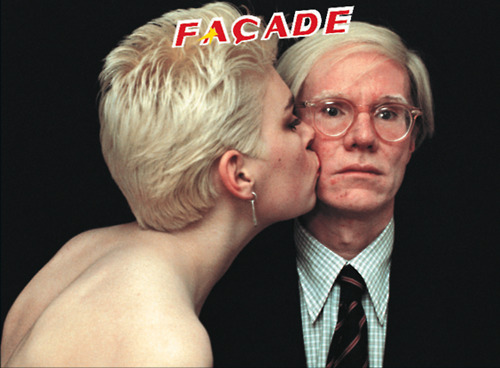
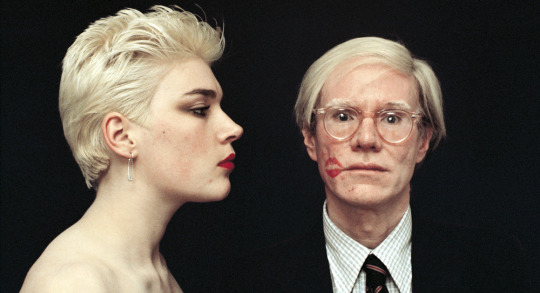
With Andy Warhol for Façade, Paris, 1977
Edwige recalls of the shoot that she spoke very little English at the time – and Andy no French – but the pair managed to strike up a rapport via instinctive, non-verbal communication. When she travelled to New York later that year, she gave Andy a call, and he brought her along to Studio 54. “Approaching the illustrious nightclub of all nightclubs, swathes of partiers parted like the red sea as she entered the club for her very first time, arm-in-arm with her regal rebel counterpart,” reports Autre Magazine.[20]
This ultimate outsider quickly found acceptance from the ultimate insiders of New York and Paris. Brought to a party by Paloma Picasso, she was spotted by Helmut Newton who, rumour has it, persisted to follow her around the party, begging to photograph her. She relented, but insisted she was photographed “not as a model, but as a personality.”[21] She also sat for Francesco Clemente, who painted her with “eyes half closed and completely blue … I was nodding out or on drugs. Blue, blue, blue, blue!”[22]

With Helmut Newton, 1986
Upon her return to Paris, Edwige was appointed front-of-house at Le Palace, the city’s answer to Studio 54, where the staff wore crimson and gold tunics designed by Thierry Mugler and Grace Jones performed atop a pink Harley Davidson on the opening night. Everyone from Yves Saint Laurent to Roland Barthes came there to party, and Edwige’s job was essentially to decide who would be permitted entrance. She took the same, seemingly contradictory, approach to the door policy as she did her fashion choices, creating a mix of elite and punk, gay and straight, black and white, rich and poor. “Karl Lagerfeld mentioned in his book that I once refused the King of Sweden because obviously, he must have been an asshole.”[23]
Its perhaps in this role – the high/low gatekeeper of Parisian nightlife – in which Edwige is most fondly remembered. When she died in 2015, tributes came flooding in on social media. One of the most substantial homages to Edwige to date has been Jean Paul Gaultier’s Spring/Summer 2016 couture show, which was both inspired by and devoted to his late muse. Gaultier’s collection was a 70s-inspired romp of butch tailoring, femme sequin jumpsuits and sassy models. “Red lips, fishnet tights, lamé; gold leggings, white gloves it was all about attitude, attitude, attitude,” read the review by British Vogue.[24]

Jean Paul Gaultier’s Spring/Summer 2016 couture show, a tribute to Edwige, complete with mock Le Palace façade, an Edwige-inspired ‘bouncer’ and lesbian trysts with runway models
The show opens with a lesbian tryst between a runway girl and an androgynous pixie-cropped model who starts manning the door of a club, a replica of ‘Le Palace’. The parade of models who sashay up and down the runway includes Anna Cleveland, daughter of legendary model Pat, who Edwige surely must have rubbed shoulders with at Studio 54. The girls bring their cigarettes and glasses of champagne along for the walk, stopping to air-kiss one another (or catfight) en route. For the finale, the our queer heroine pulls door-girl ‘Edwige’ inside ‘The Palace’. The curtains descend and reveal the full crew of models, accompanied by Mr Gaultier, dancing, laughing and drinking champagne to the sound of Amanda Lear’s ‘Fashion Pack’.
If heaven looks like this, I do hope they let me in.
Babette, 25.08.17
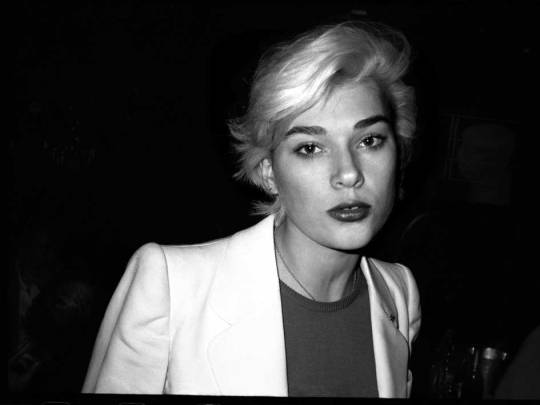


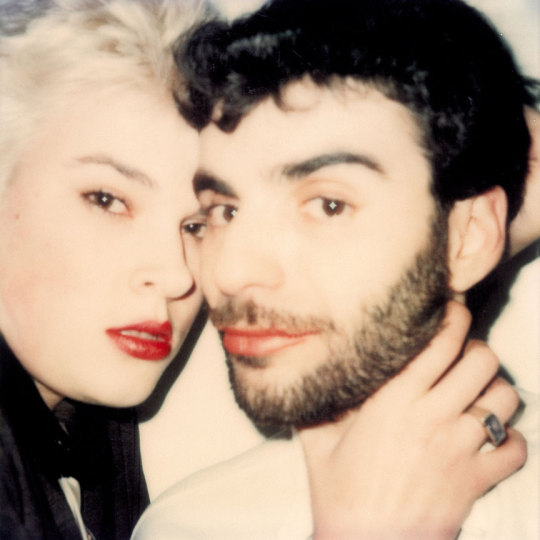
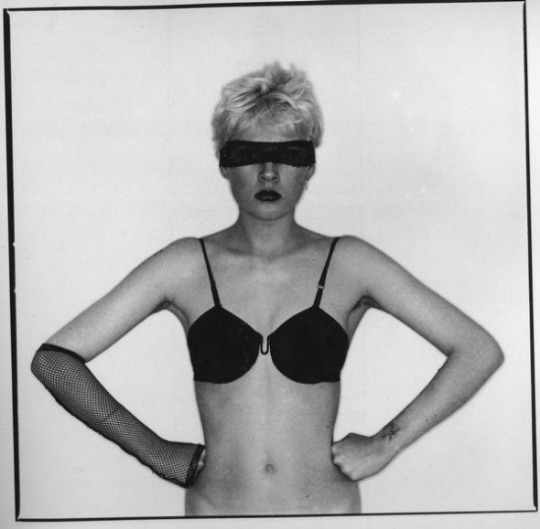
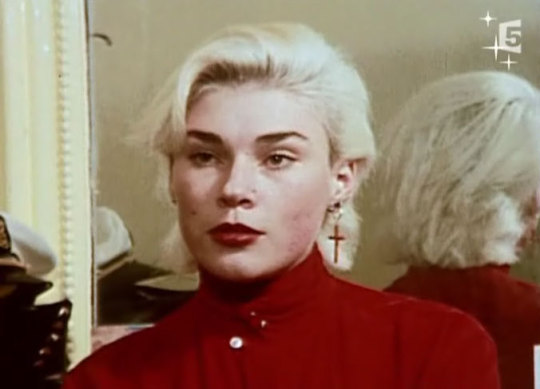
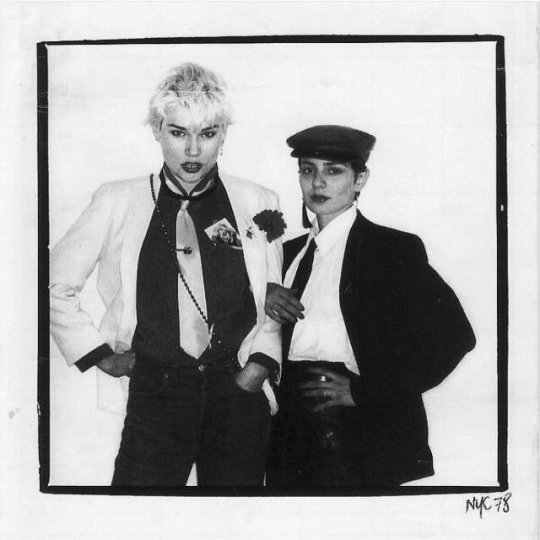

FOOTNOTES
[1] Edwige Belmore, quoted in Eepmon, ‘In Conversation with Edwige Belmore, The Queen of Punk Pt.2′, Moco Loco, 31 December 2014, accessed online at http://mocoloco.com/in-conversation-with-eepmon-edwige-belmore-the-queen-of-punk-pt2/ on 19 August 2017
[2] Clayton Patterson, quoted in Walter Armstrong, ‘The Life of Punk Queen Edwige Belmore and the Death of the Old Downtown’, New York Magazine, 25 September 2015, accessed online at http://nymag.com/daily/intelligencer/2015/09/edwige-belmore-death-of-a-punk-queen.html on 19 August 2017
[3] Edwige Belmore, quoted in a video interview with Barbara Frigerio, ‘Focus on: Edwige Belmore’, Vogue Italia, 4 July 2011, accessed online at http://www.vogue.it/en/people-are-talking-about/focus-on/2011/07/edwige-belmore#ad-image102614 on 19 August 2017
[4] Marcus Leatherdale, quoted in New York Magazine, ibid.
[5] Moco Loco, ibid.
[6] ibid.
[7] Patterson, ibid.
[8] Sandra Schulman, ‘Death of a Glamazon. A Tattooed Love Letter to Edwige’, Please Kill Me, 26 September 2015, accessed online at http://pleasekillme.com/death-of-a-glamazon-a-tattooed-love-letter-to-edwige/ on 19 August 2017
[9] ibid.
[10] Patterson, ibid.
[11] Kendall Werts, quoted in New York Magazine, ibid.
[12] Penny Arcade, quoted in New York Magazine, ibid.
[13] Edwige Belmore, quoted in Eepmon, ‘In Conversation with Edwige Belmore, The Queen of Punk Pt.1′, Moco Loco, 31 December 2014, accessed online at http://mocoloco.com/in-conversation-with-eepmon-edwige-belmore-the-queen-of-punk-pt1/ on 19 August 2017
[14] ibid.
[15] ibid.
[16] Vogue Italia, ibid.
[17] ibid.
[18] ibid.
[19] Pt.1, Moco Loco, ibid.
[20] Summer Bowie, ‘Beautiful Vagabond: 10 Things You Need to Know About the Late Edwige Belmore’, Autre Magazine, 24 September 2015, accessed online at http://autre.love/this-and-that-main/2015/9/24/beautiful-vagabond-10-things-you-need-to-know-about-the-late-edwige-belmore on 19 August 2017
[21] Pt.1, Moco Loco, ibid.
[22] Pt.2, Moco Loco, ibid.
[23] Nick Vogelson, ‘In Memory: Edwige Belmore, Our Lady of Punk’, Document Journal, 22 September 2015, accessed online at http://www.documentjournal.com/article/in-memory-our-lady-of-punk on 19 August 2017
[24] Ellie Pithers, ‘Spring/Summer 2016 Couture: Jean Paul Gaultier’, Vogue, 27 January 2016, accessed online at http://www.vogue.co.uk/shows/spring-summer-2016-couture/jean-paul-gaultier on 19 August 2017
#edwige#edwige belmore#punk#subculture#studio 54#le palace#jean paul gaultier#couture#paris#new york#club kids#Mathématiques Modernes#queer#bisexual#lesbian#peroxide#new wave#coldwave#Agnès b#tattoos#self-harm#reinvention#andy warhol#façade magazine#helmut newton#butch#femme#fashion
17 notes
·
View notes
Link
“A PROTEST POETRY intended to induce funks of ambivalence.” That phrase appears in Stan Apps’s “Free Dolphin Radio,” the opening poem of Flarf: An Anthology of Flarf. While its placement may have been fortuitous (given the book’s alphabetical arrangement by author), it seems a fitting motto for the entire collection, as well as for the movement the book presents as a whole. “Flarf” refers to a self-styled avant-garde collective that sprung up around 2000 and was devoted to exploring the web, then in its “wild west” phase, as a resource for making poetry. On a private email list, its members developed a technique they refer to as “Google sculpting,” which calls for the poet to trawl the internet for preexisting language, usually by putting combinations of intentionally silly or offensive keywords into a search engine (“pizza” and “kitty,” “Rogaine” and “bunny,” “pussy” and “turtleneck”) and then creatively arranging the results into strange, funny, and unsettling collages. Voilà: “Arthur Treacher grabs my assclown / Assclown grabs my squid / Squid signs me up for the NOW Action Alert list.” (This is from Sharon Mesmer’s “Squid Versus Assclown.”)
The name “Flarf” is a neologism, which one of its founders, Gary Sullivan, defines as describing “a kind of corrosive, cute, or cloying, awfulness. Wrong. Un-P.C. Out of control. ‘Not okay.’” It is also, he explains, a verb, meaning “to bring out the inherent awfulness, etc., of some pre-existing text” (thus, one can “Flarf” any unsuspecting piece of writing). Flarf, you might say, is what poetry would sound like “if pirates pumped the stuffed-up airwaves full of dolphin hymns and rat speak,” to quote another line from that same opening poem.
In the early 2000s, Flarf was a big cartoon thumb stuck in the eye of the poetry establishment. Pumped full of “rat speak” by pirate poets sailing the high seas of the internet, Flarf poems were disjunctive works made from the ugly feelings, vulgarity, and raucous surreality that colors our everyday experience in the digital age. With language extracted from chat rooms, message boards, and the underbelly of our online lives, the poems were deliberately messy, abrasive, and distasteful. But Flarf was also ostensibly “a protest poetry”: from the start, the Flarfists explained that they were supplying a subversive response to the nightmarish absurdity and deceit of contemporary culture in the post-9/11 era. Mostly, though, it seemed custom-designed to provoke misgivings from arbiters of taste and to induce “funks of ambivalence” about its aesthetics, its politics, and its worldview from both staid cultural gatekeepers and other avant-garde poets.
The funk continues to linger over Flarf, now more a period style than a going concern. While it has been claimed as a powerful and enduring intervention in the development of American poetry, some see it as little more than an extended prank; others insist it was only a tired retread of Dada and other earlier avant-garde experiments. Some claim its practice of borrowing language from “ordinary” people on the internet (often riddled with misspellings, stupidity, racism, and xenophobia) is ultimately patronizing, elitist, a form of punching down. Flarf has been dogged, too, by ethical questions about whether the reproduction of hateful, offensive language perpetuates rather than critiques harmful stereotypes and prejudices.
This anthology will probably not put such questions to rest. For one thing, it’s not clear why the Flarfists decided to publish this collection of their work (co-edited by five of its members) now, at a time when many of the poets themselves have moved on, and the more heated debates about the movement have subsided. Is the anthology meant to provide a snapshot of a vital and ongoing phenomenon, like Donald Allen’s The New American Poetry? Is the timing of its appearance intended to suggest that Bush-era Flarf is now newly relevant in the dark age of Trump? Or is it more a bid for canonization, an enshrinement of a now-defunct avant-garde in poetic history?
It’s even harder to answer these questions because, unlike many such collections, Flarf is completely devoid of scholarly apparatus and critical framework: it has no preface or introduction, no manifestos or statements of poetics. There’s no effort to define Flarf or trace its origins or goals, no attempt to explain its methods or sketch out its intellectual or poetic investments. It is nearly impossible to tell when the poems were written, or whether any of the material in the book is new or recent, or if it all dates from Flarf’s heyday, over a decade ago. Of course the editors’ decision to remove all context and helpful framing is probably deliberate, in keeping with the anarchic spirit of the movement, which is as allergic as Dada was to high seriousness, “official” institutions, the canon, and so on. But if that’s the case, then why produce an anthology at all? At the very least, a few signposts would have helped orient a younger generation of readers who missed the Flarf moment the first time around.
What we are left with, of course, are the poems themselves, giving us the opportunity to take stock of Flarf’s achievement, as it gathers in one place many of its best-known, and best, works, including Drew Gardner’s “Chicks Dig War,” Jordan Davis’s “Pablo Escobar Shopping T-Shirt,” Michael Magee’s “Mainstream Poetry,” Sharon Mesmer’s “Annoying Diabetic Bitch,” K. Silem Mohammad’s “Mars Needs Terrorists,” and selections from Katie Degentesh’s The Anger Scale. Left to fend for themselves, these poems do make a sort of argument for Flarf’s value, and relevance. From the vantage point of 2018, Flarf can be seen as a compelling extension of the long, vital tradition of avant-garde collage, appropriation, and remix, updated for the internet age in intriguing ways. The best Flarf poems use the resources of search-engine technology to capture the exuberance, the strangeness, and the cracked beauty of what Anne Boyer calls our “electronic vernacular.” Jordan Davis suggests as much in one poem when he writes, “‘What I love about the chat rooms / Is that they’re already halfway to poetry, / What’s poetry but lines, what’s a chatroom,’ / He started rubbing the squid.” Where else can one find a poem titled “Humanism Is Cheese” or another with lines like these: “Phoenix is the land of milk dowsers, / and I’ve always been / a wolverine bunny cage xenocide forum asshole”? The poems teem with a density of reference, evincing the strange magnetic power of labels, names, and data in a culture drowning in signifiers: “Dag Hammarskjold rolls off our lips as easily as Lassie,” Boyer writes. “I just killed the Pillsbury dough boy,” the speaker of one of Gardner’s poems announces, before quickly bouncing off toward Terry Gross, “Charman” Mao, Shelley Duvall, Wallace Stevens, Minnie Driver, and Dan Rather.
Other poems crackle with the upending of clichés (“Same old job, / same old Diplodocus bong water orgy” — Gardner again). They frequently delight in the twisting of expectations, as in these lines by Mohammad, where the hackneyed language of romance is infused with militarism and violence:
love is a Pakistani Mirage fighter jet
frozen, strange
like it had, you know, bubonic plague
I’m a bit less crazy about Flarf’s fondness for goofy, supposedly “transgressive” scatology and the sometimes exhausting levels of zaniness — poems where we learn that “I have to conduct snot viscosity experiments / with ass-lint,” (Mitch Highfill) and so on. But although the movement has been maligned for focusing too much on play and hijinks, for being just a bunch of friends “fucking around with google on the man’s dime” (as Gardner himself once put it), Flarf can in fact be fiercely political: poem after poem takes aim at toxic masculinity, American warmongering and imperialism, virulent racism, the intersections between porn and rape culture, and the penetration of neoliberal capitalism into every sphere of daily life. I fully expected to find that revisiting Flarf at this particular historical moment would feel like stepping out of the Tardis into the now distant days of “Shock and Awe,” where John Ashcroft makes jokes about Abu Ghraib over the sound of Howard Dean’s scream and ends up in a spider hole of denial. But many of the poems feel surprisingly timely, very much in touch with our own batshit zeitgeist. “I hate the high levels of jerk war around here,” Gardner writes in “Skylab Wolverine Bunny Cage Nub” (Twitter, anyone?). Benjamin Friedlander’s potent poem “When a Cop Sees a Black Woman” has a different charge in a post-Ferguson world:
Black hair
is more fragile than most.
It requires TLC
when a cop sees a black women
he can’t think
everything through. She is
the shiznit. She tempts and she taunts.
She speaks in a bold
outspoken manner. But bypassing
a metal detector, his forced
and never-bending
monotone drone
is not a factor
in her arrest.
The same could be said of Gardner’s “How to Watch a Police Beating,” which follows its title with these scathing opening lines: “First off, there should be two sets of laws — / act like an ox and try not to be nonwhite…”
Other poems repurpose gender codes and tropes in ways that resonate powerfully in the #MeToo era. Consider Nada Gordon’s “I Love Men” (“I love men, but they wear me out with all their confusing issues. One day they / say they love you and the next they see someone with bigger ass. // I love men, muscles, sex, porn, and chocolate”). Or Katie Degentesh’s “I Was Horny,” which stitches together a series of found statements, substituting the word “boy” for “owl,” creating an affecting, creepy commentary on predatory masculinity and the culture that fosters it:
Boys are interesting creatures.
[…]
The boys tear their prey, swallow it whole, and spit up pellets.
They prey on small things. Boys fly silently. They see well in the dark,
hunt at night and sleep in the daytime. They scare others by fluffing up.
[…]
I hope boys never go extinct and I hope they never get endangered. I love boys.
¤
In the decade and a half since Flarf emerged, strategies of appropriation of the sort these poets deploy have spread far and wide. It is worth noting that they have proven particularly useful as vehicles of political critique and dissent for a long list of poets of color not affiliated with the (largely white) Flarf coterie itself, who have seized on such tools to create works that take aim at racism, US foreign policy, police brutality, oppression, and misogyny, often more directly and powerfully than Flarf. In her award-winning collection Look, for example, Solmaz Sharif incorporates euphemistic phrases from a Department of Defense manual but scrutinizes, dismantles, and subverts them, redeploying this found material for both intimate personal reflection and for expressing coruscating outrage at contemporary racism, xenophobia, and anti-Muslim policies. I would recommend reading this anthology of Flarf alongside other contemporary poets like Sharif, Tracy K. Smith, Robin Coste Lewis, Philip Metres, Layli Long Soldier, Shane McCrae, and Tyehimba Jess to get a fuller sense of the ends to which such tactics have been put in recent poetry.
Faced with the daily calamity of the Bush years, Flarf testified that verbal play, and the creative détournement of our culture’s own language, could be a liberating act of resistance. Its antics were a valuable method of pushing back against what Wallace Stevens called, in another dark time, the almost unbearable “pressure of reality.” Perhaps right now we desperately need art forms that can seize on the language of our time, expose its absurdity, its deceit, and its sinister designs on us, and repurpose it for different ends. But in 2018, the online culture of misogyny, racism, stupidity, and hatred that Flarf exposed doesn’t need much further unearthing: it seems to be everywhere. As we gasp for air and sanity in the depths of Trumpworld, Flarf seems prescient but also somewhat redundant. To paraphrase Man Ray’s famous remark about why Dada could not survive in New York: Flarf cannot live in America. All America is Flarf, and will not tolerate a rival.
¤
Andrew Epstein is the author, most recently, of Attention Equals Life: The Pursuit of the Everyday in Contemporary Poetry and Culture.
The post Funks of Ambivalence: On Flarf appeared first on Los Angeles Review of Books.
from Los Angeles Review of Books https://ift.tt/2LBSmbD
via IFTTT
0 notes
Link
“A PROTEST POETRY intended to induce funks of ambivalence.” That phrase appears in Stan Apps’s “Free Dolphin Radio,” the opening poem of Flarf: An Anthology of Flarf. While its placement may have been fortuitous (given the book’s alphabetical arrangement by author), it seems a fitting motto for the entire collection, as well as for the movement the book presents as a whole. “Flarf” refers to a self-styled avant-garde collective that sprung up around 2000 and was devoted to exploring the web, then in its “wild west” phase, as a resource for making poetry. On a private email list, its members developed a technique they refer to as “Google sculpting,” which calls for the poet to trawl the internet for preexisting language, usually by putting combinations of intentionally silly or offensive keywords into a search engine (“pizza” and “kitty,” “Rogaine” and “bunny,” “pussy” and “turtleneck”) and then creatively arranging the results into strange, funny, and unsettling collages. Voilà: “Arthur Treacher grabs my assclown / Assclown grabs my squid / Squid signs me up for the NOW Action Alert list.” (This is from Sharon Mesmer’s “Squid Versus Assclown.”)
The name “Flarf” is a neologism, which one of its founders, Gary Sullivan, defines as describing “a kind of corrosive, cute, or cloying, awfulness. Wrong. Un-P.C. Out of control. ‘Not okay.’” It is also, he explains, a verb, meaning “to bring out the inherent awfulness, etc., of some pre-existing text” (thus, one can “Flarf” any unsuspecting piece of writing). Flarf, you might say, is what poetry would sound like “if pirates pumped the stuffed-up airwaves full of dolphin hymns and rat speak,” to quote another line from that same opening poem.
In the early 2000s, Flarf was a big cartoon thumb stuck in the eye of the poetry establishment. Pumped full of “rat speak” by pirate poets sailing the high seas of the internet, Flarf poems were disjunctive works made from the ugly feelings, vulgarity, and raucous surreality that colors our everyday experience in the digital age. With language extracted from chat rooms, message boards, and the underbelly of our online lives, the poems were deliberately messy, abrasive, and distasteful. But Flarf was also ostensibly “a protest poetry”: from the start, the Flarfists explained that they were supplying a subversive response to the nightmarish absurdity and deceit of contemporary culture in the post-9/11 era. Mostly, though, it seemed custom-designed to provoke misgivings from arbiters of taste and to induce “funks of ambivalence” about its aesthetics, its politics, and its worldview from both staid cultural gatekeepers and other avant-garde poets.
The funk continues to linger over Flarf, now more a period style than a going concern. While it has been claimed as a powerful and enduring intervention in the development of American poetry, some see it as little more than an extended prank; others insist it was only a tired retread of Dada and other earlier avant-garde experiments. Some claim its practice of borrowing language from “ordinary” people on the internet (often riddled with misspellings, stupidity, racism, and xenophobia) is ultimately patronizing, elitist, a form of punching down. Flarf has been dogged, too, by ethical questions about whether the reproduction of hateful, offensive language perpetuates rather than critiques harmful stereotypes and prejudices.
This anthology will probably not put such questions to rest. For one thing, it’s not clear why the Flarfists decided to publish this collection of their work (co-edited by five of its members) now, at a time when many of the poets themselves have moved on, and the more heated debates about the movement have subsided. Is the anthology meant to provide a snapshot of a vital and ongoing phenomenon, like Donald Allen’s The New American Poetry? Is the timing of its appearance intended to suggest that Bush-era Flarf is now newly relevant in the dark age of Trump? Or is it more a bid for canonization, an enshrinement of a now-defunct avant-garde in poetic history?
It’s even harder to answer these questions because, unlike many such collections, Flarf is completely devoid of scholarly apparatus and critical framework: it has no preface or introduction, no manifestos or statements of poetics. There’s no effort to define Flarf or trace its origins or goals, no attempt to explain its methods or sketch out its intellectual or poetic investments. It is nearly impossible to tell when the poems were written, or whether any of the material in the book is new or recent, or if it all dates from Flarf’s heyday, over a decade ago. Of course the editors’ decision to remove all context and helpful framing is probably deliberate, in keeping with the anarchic spirit of the movement, which is as allergic as Dada was to high seriousness, “official” institutions, the canon, and so on. But if that’s the case, then why produce an anthology at all? At the very least, a few signposts would have helped orient a younger generation of readers who missed the Flarf moment the first time around.
What we are left with, of course, are the poems themselves, giving us the opportunity to take stock of Flarf’s achievement, as it gathers in one place many of its best-known, and best, works, including Drew Gardner’s “Chicks Dig War,” Jordan Davis’s “Pablo Escobar Shopping T-Shirt,” Michael Magee’s “Mainstream Poetry,” Sharon Mesmer’s “Annoying Diabetic Bitch,” K. Silem Mohammad’s “Mars Needs Terrorists,” and selections from Katie Degentesh’s The Anger Scale. Left to fend for themselves, these poems do make a sort of argument for Flarf’s value, and relevance. From the vantage point of 2018, Flarf can be seen as a compelling extension of the long, vital tradition of avant-garde collage, appropriation, and remix, updated for the internet age in intriguing ways. The best Flarf poems use the resources of search-engine technology to capture the exuberance, the strangeness, and the cracked beauty of what Anne Boyer calls our “electronic vernacular.” Jordan Davis suggests as much in one poem when he writes, “‘What I love about the chat rooms / Is that they’re already halfway to poetry, / What’s poetry but lines, what’s a chatroom,’ / He started rubbing the squid.” Where else can one find a poem titled “Humanism Is Cheese” or another with lines like these: “Phoenix is the land of milk dowsers, / and I’ve always been / a wolverine bunny cage xenocide forum asshole”? The poems teem with a density of reference, evincing the strange magnetic power of labels, names, and data in a culture drowning in signifiers: “Dag Hammarskjold rolls off our lips as easily as Lassie,” Boyer writes. “I just killed the Pillsbury dough boy,” the speaker of one of Gardner’s poems announces, before quickly bouncing off toward Terry Gross, “Charman” Mao, Shelley Duvall, Wallace Stevens, Minnie Driver, and Dan Rather.
Other poems crackle with the upending of clichés (“Same old job, / same old Diplodocus bong water orgy” — Gardner again). They frequently delight in the twisting of expectations, as in these lines by Mohammad, where the hackneyed language of romance is infused with militarism and violence:
love is a Pakistani Mirage fighter jet
frozen, strange
like it had, you know, bubonic plague
I’m a bit less crazy about Flarf’s fondness for goofy, supposedly “transgressive” scatology and the sometimes exhausting levels of zaniness — poems where we learn that “I have to conduct snot viscosity experiments / with ass-lint,” (Mitch Highfill) and so on. But although the movement has been maligned for focusing too much on play and hijinks, for being just a bunch of friends “fucking around with google on the man’s dime” (as Gardner himself once put it), Flarf can in fact be fiercely political: poem after poem takes aim at toxic masculinity, American warmongering and imperialism, virulent racism, the intersections between porn and rape culture, and the penetration of neoliberal capitalism into every sphere of daily life. I fully expected to find that revisiting Flarf at this particular historical moment would feel like stepping out of the Tardis into the now distant days of “Shock and Awe,” where John Ashcroft makes jokes about Abu Ghraib over the sound of Howard Dean’s scream and ends up in a spider hole of denial. But many of the poems feel surprisingly timely, very much in touch with our own batshit zeitgeist. “I hate the high levels of jerk war around here,” Gardner writes in “Skylab Wolverine Bunny Cage Nub” (Twitter, anyone?). Benjamin Friedlander’s potent poem “When a Cop Sees a Black Woman” has a different charge in a post-Ferguson world:
Black hair
is more fragile than most.
It requires TLC
when a cop sees a black women
he can’t think
everything through. She is
the shiznit. She tempts and she taunts.
She speaks in a bold
outspoken manner. But bypassing
a metal detector, his forced
and never-bending
monotone drone
is not a factor
in her arrest.
The same could be said of Gardner’s “How to Watch a Police Beating,” which follows its title with these scathing opening lines: “First off, there should be two sets of laws — / act like an ox and try not to be nonwhite…”
Other poems repurpose gender codes and tropes in ways that resonate powerfully in the #MeToo era. Consider Nada Gordon’s “I Love Men” (“I love men, but they wear me out with all their confusing issues. One day they / say they love you and the next they see someone with bigger ass. // I love men, muscles, sex, porn, and chocolate”). Or Katie Degentesh’s “I Was Horny,” which stitches together a series of found statements, substituting the word “boy” for “owl,” creating an affecting, creepy commentary on predatory masculinity and the culture that fosters it:
Boys are interesting creatures.
[…]
The boys tear their prey, swallow it whole, and spit up pellets.
They prey on small things. Boys fly silently. They see well in the dark,
hunt at night and sleep in the daytime. They scare others by fluffing up.
[…]
I hope boys never go extinct and I hope they never get endangered. I love boys.
¤
In the decade and a half since Flarf emerged, strategies of appropriation of the sort these poets deploy have spread far and wide. It is worth noting that they have proven particularly useful as vehicles of political critique and dissent for a long list of poets of color not affiliated with the (largely white) Flarf coterie itself, who have seized on such tools to create works that take aim at racism, US foreign policy, police brutality, oppression, and misogyny, often more directly and powerfully than Flarf. In her award-winning collection Look, for example, Solmaz Sharif incorporates euphemistic phrases from a Department of Defense manual but scrutinizes, dismantles, and subverts them, redeploying this found material for both intimate personal reflection and for expressing coruscating outrage at contemporary racism, xenophobia, and anti-Muslim policies. I would recommend reading this anthology of Flarf alongside other contemporary poets like Sharif, Tracy K. Smith, Robin Coste Lewis, Philip Metres, Layli Long Soldier, Shane McCrae, and Tyehimba Jess to get a fuller sense of the ends to which such tactics have been put in recent poetry.
Faced with the daily calamity of the Bush years, Flarf testified that verbal play, and the creative détournement of our culture’s own language, could be a liberating act of resistance. Its antics were a valuable method of pushing back against what Wallace Stevens called, in another dark time, the almost unbearable “pressure of reality.” Perhaps right now we desperately need art forms that can seize on the language of our time, expose its absurdity, its deceit, and its sinister designs on us, and repurpose it for different ends. But in 2018, the online culture of misogyny, racism, stupidity, and hatred that Flarf exposed doesn’t need much further unearthing: it seems to be everywhere. As we gasp for air and sanity in the depths of Trumpworld, Flarf seems prescient but also somewhat redundant. To paraphrase Man Ray’s famous remark about why Dada could not survive in New York: Flarf cannot live in America. All America is Flarf, and will not tolerate a rival.
¤
Andrew Epstein is the author, most recently, of Attention Equals Life: The Pursuit of the Everyday in Contemporary Poetry and Culture.
The post Funks of Ambivalence: On Flarf appeared first on Los Angeles Review of Books.
from Los Angeles Review of Books https://ift.tt/2LBSmbD
0 notes